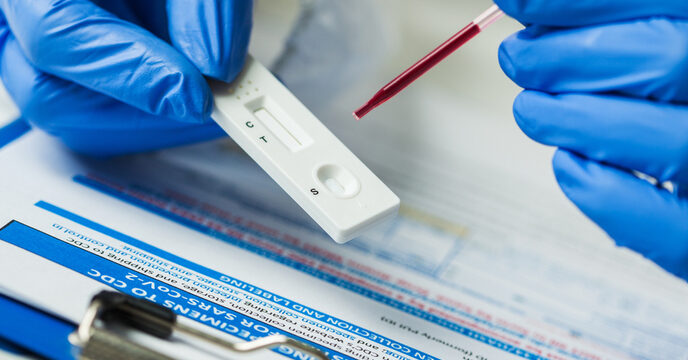The need for rapid medical tests has been apparent for many decades now and innovation and technology are finally catching up. We’re in a new age of rapid blood testing, a time when a diagnostic platform contained within a single compact instrument can directly compete with off-site labs.
Of course, we’re also in the middle of a terrifying and deadly global pandemic that is kickstarting a whole new revolution in rapid antibody testing. The convergence of these historic events and trends is likely to have a powerful effect on rapid testing technology and the blood testing industry as a whole.
Antibody Tests
Being as how we’re in the midst of a global pandemic, it should come as no surprise that medical professionals want to expedite antibody testing to help curb the spread of the virus. Antibody tests, known in the medical world as serologic tests, work by detecting the creation of antibodies in the blood, which is a major indicator that the body’s immune system is fighting infection.
Amy Karger, an associate professor of laboratory medicine and pathology at the University of Minnesota Medical School, explains the methodology:
“The tests all have proteins that are from the virus. If the antibodies in the blood bind to those proteins from the test, you’ll get a positive signal. It’s basically trying to figure out if you have those antibodies that specifically bind to the virus, and that indicates that you had an infection, either current or past.”
In the case of the SARS-CoV-2, which is the virus that causes COVID-19, the test looks for IgM and IgC antibodies. Researchers in China additionally tested for immunoglobulin M (IgM) and immunoglobulin G (IgG). IgG is generally considered a good indicator of long-term immunity.
Antibody tests, such as Easy Check by Truvian Sciences, are diagnostic serologic tests that can identify people whose immune systems are currently fighting infection, or have recently been fighting off a virus. Such information is incredibly valuable for individuals in terms of knowing if they need to quarantine themselves to prevent spreading the virus to their families, friends, or communities.
The authors of the report from June that studied immunoglobulin M (IgM) and immunoglobulin G (IgG) suggest that COVID-19 antibodies can disappear after only 2-3 months.
“Together, these data might indicate the risks of using COVID-19 ‘immunity passports’ and support the prolongation of public health interventions, including social distancing, hygiene, isolation of high-risk groups and widespread testing,” they wrote.
Easy Check information can also provide companies and healthcare officials with scalable testing data for a more macroscopic analysis of risk, exposure history, and containment strategy. Realistically, such insight could save thousands of lives.
The Easy Check test is a “lateral flow immunochromatographic assay for detection of SARS-CoV-2 IgM/IgG antibodies” and is earning high marks among industry professionals for its compact, easy use and the fact that it renders results in 10 minutes. It scores a 98.4% in sensitivity and a 98.9% in specificity.
However, knowledge of COVID-19 antibodies is still very embryonic and disease experts and immunologists don’t yet know how long they will provide people with immunity.
Angela Rasmussen, an associate research scientist and virologist, cautioned to be on the safe side.
“If I found out I was antibody positive,” she said. “I would still practice social distancing, wearing a mask in public, avoiding crowds, taking all the same precautions I’m taking right now. Until we know more until the type of immune protection you get, people should still continue to take the same precautions to protect the community.”
The Near Future
In many ways, we’re in uncharted waters, not only in terms of the medical profession but as a global society in general. We’ve never had such an infectious novel coronavirus attack all the countries of the world at one with such devastating results.
Fortunately, doctors, immunologists, infectious disease experts, epidemiologists, and virtually every class of medical professional, including tens of thousands of heroic residential nurses (RNs), are assisting in the fight to contain COVID-19.
The tragic loss of life from this pandemic, as well as the crippling economic effects, will linger with us for years and decades. But new innovations and technology will enable us to better protect ourselves from future deadly viruses. And that’s what medical innovation is all about.

